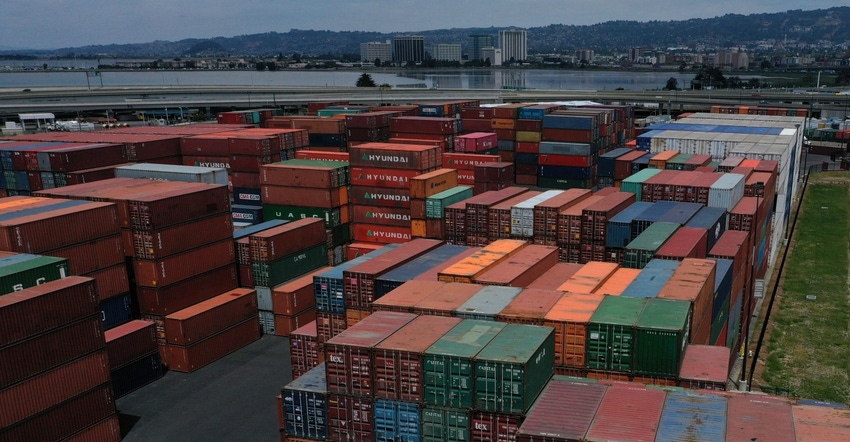
“COVID-19 revealed vulnerabilities across our supply system, both at our ports and in the agricultural sector,” explains Secretary of Agriculture Tom Vilsack. Early Monday, Vilsack announced plans to increase capacity at the Port of Oakland by partnering with the California port to set up a new 25-acre “pop-up” site to make it easier for agricultural companies to fill empty shipping containers with commodities with $1 billion in funds from the Commodity Credit Corporation.
USDA shares fewer containers have been made available for U.S. agricultural commodities, as ocean carriers have circumvented traditional marketing channels and rushed containers back to be exported empty. As a result, many of these carriers have suspended service to the Port of Oakland. USDA is now taking action to reduce these shipping disruptions that have prevented U.S. agricultural products from reaching their markets.
Using Commodity Credit Corporation funds set aside to address market disruptions in September 2021, USDA will cover 60% of the start-up costs, which reflects the historical share of agricultural products that are marketed through the Port of Oakland. USDA will also help cover additional movement logistics costs at $125 per container.
This project will enhance marketing of U.S. agricultural products through quicker pickup of empty containers as the main terminal is bypassed; access to available equipment; and fewer unpredictable congestion surcharges for trucks.
The site will provide space to prepare empty containers beginning in early March. Agricultural companies and cooperatives will have easier access to these containers, which they will fill with commodities, restoring shipping services to agricultural products while relieving congestion. The new site will also have a dedicated gate with the ability to pre-cool refrigerated shipping containers to receive perishable commodities, all while avoiding bottlenecks that would have resulted from entering the main area of the Port.
Ship Report 1/27: 82 total ships inport LA/LB including 25 at anchor or loitering & 57 at berths. Of the 82, 33 are container ships including 5 at anchor or loitering & 28 at berths. 2 vessels loitering; 1 container ship, 1 tanker.
— Marine Exchange (@MXSOCAL) January 27, 2022
More: https://t.co/5aY5tY73aY pic.twitter.com/kB52wCrJVk
In December, Secretary of Transportation Pete Buttigieg and Vilsack urged the world’s leading ocean carriers to help mitigate disruptions to agricultural shippers by restoring reciprocal treatment of imports and exports and improving service. Ocean carriers have made fewer containers available for U.S. agricultural commodities, repeatedly changed return dates, and charged unjust fees as the ocean carriers short-circuited the usual pathways and rushed containers back to be exported empty. The poor service and refusal to serve customers is exemplified by many ocean carriers suspending service to the Port of Oakland. DOT and USDA called on the carriers to more fully utilize available terminal capacity on the West Coast. At least one carrier has since announced plans to resume previously suspended service to Oakland.
“This creative partnership with USDA and the Port of Oakland will help American farmers and agricultural producers move their product to market while also making better use of empty containers that are causing congestion at the ports,” says Buttigieg. “After we helped set up inland pop-up ports at the Port of Savannah, we witnessed significant improvements in the flow of goods, and we expect to see similarly positive results once this Oakland facility is open. We look forward to engaging with other ports on similar solutions to congestion.”
Industry welcomes port actions
U.S. Meat Export Federation President and CEO Dan Halstrom says meat exporters appreciate the efforts of USDA, the Port of Oakland and other agencies to address a situation that continues to frustrate U.S. exporters.
“We realize there is no magic solution to the shipping difficulties confronting exporters at U.S. ports, but improving access to containers is certainly a step in the right direction,” Halstrom says. “The Port of Oakland is an essential, strategic outlet for U.S. red meat exports, especially for chilled product destined for our key Asian markets, and our members look forward to utilizing the new container site.”
"This is an important step that shows the value of players in the supply chain coming together to identify challenges as well as potential solutions,” adds California Department of Food and Agriculture Secretary Karen Ross. “It will help improve access to overseas markets for California agriculture producers at a critical time of year for exports of high-value specialty crops.”
The International Dairy Foods Association recently announced a Dairy Exports Working Group with the Port of Los Angeles and shipping company CMA CGM to identify and address similar supply chain issues hindering U.S. dairy product exports.
“We are hopeful that these announcements together signal a new group of ‘supply chain problem solvers’ to create momentum to smooth current obstacles and avoid significant future disruptions so that American agriculture can continue to thrive” explains IDFA President and CEO Michael Dykes. “It is encouraging to see governments and businesses working together in a coordinated fashion to develop market-based solutions.”
The current situation is costing U.S. dairy companies millions of dollars and damaging the credibility and reputation of U.S. dairy exporters among global customers. For example, dairy exporters are having to airfreight product more than ever before, sometimes at 20 times the cost, to meet overseas contracts. At the same time, U.S. warehouses are full or facing near capacity levels due to delays.
About the Author(s)
You May Also Like






